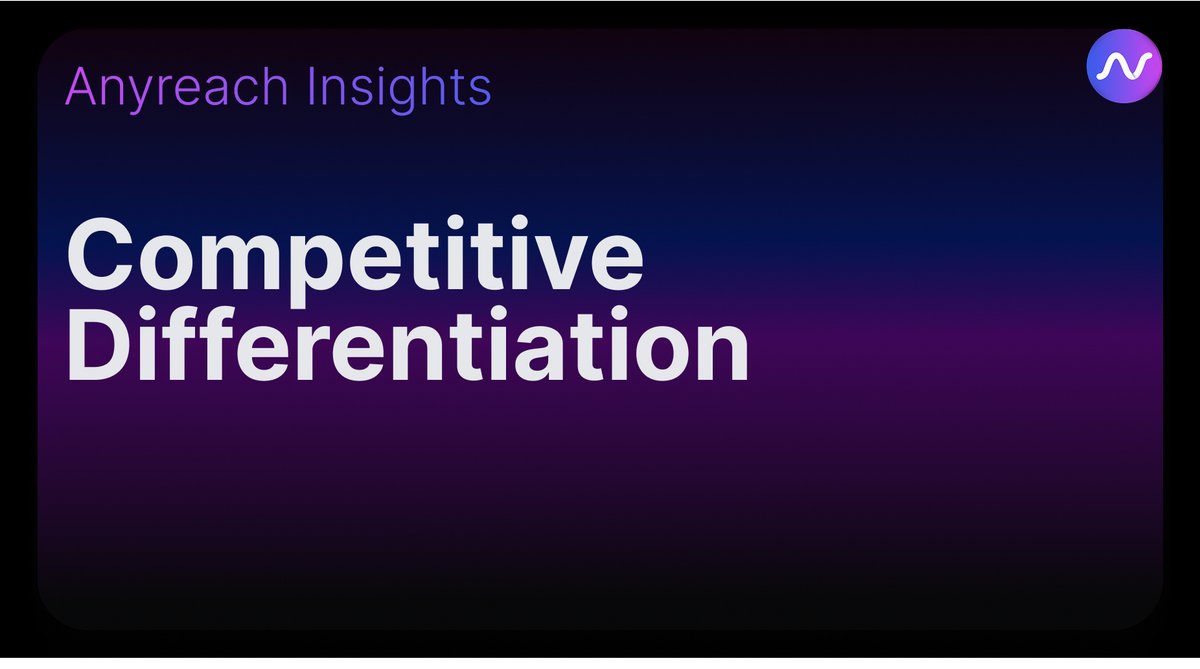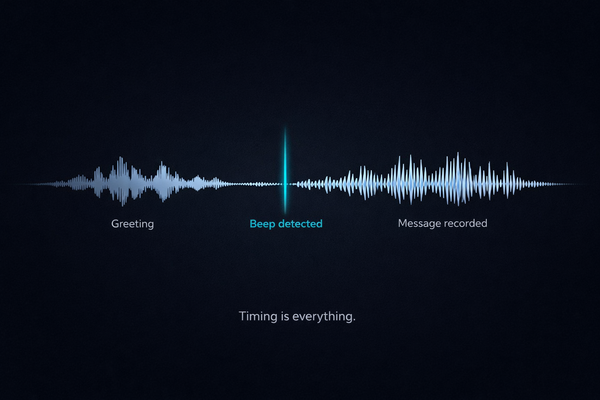How to Differentiate Agentic AI Platforms: A Guide to Avoiding Bland Solutions

What is competitive differentiation in agentic AI?
Competitive differentiation in agentic AI represents the unique capabilities and value propositions that distinguish platforms from commoditized solutions flooding the enterprise market. Unlike traditional automation tools, differentiated agentic AI platforms offer genuine autonomous decision-making, goal-directed behavior, and measurable business outcomes that transcend basic AI features.
The importance of differentiation has intensified as major vendors like Microsoft and Salesforce introduce similar capabilities, creating a risk of commoditization. According to Gartner research, over 40% of agentic AI projects are predicted to fail by 2027, primarily due to lack of clear differentiation and demonstrable ROI. This makes understanding and evaluating unique value propositions critical for enterprise success.
Key differentiation factors include:
- Autonomous Capabilities: True agentic behavior versus rebranded automation
- Vertical Specialization: Industry-specific features and compliance
- Technical Innovation: Proprietary capabilities like emotion AI or voice biometrics
- Integration Excellence: Seamless omni-channel orchestration
- Measurable Outcomes: Proven ROI with specific use case success
Enterprises evaluating agentic AI platforms must look beyond surface-level features to identify genuine differentiation. This involves assessing whether a platform offers unique technical capabilities, industry expertise, or implementation approaches that competitors cannot easily replicate. The goal is avoiding bland, one-size-fits-all solutions that fail to deliver competitive advantage.
How do enterprises compare agentic AI platforms?
Enterprises compare agentic AI platforms through a multi-dimensional evaluation framework focusing on ROI potential, integration complexity, vendor track record, and unique capabilities. The comparison process has evolved beyond simple feature checklists to encompass strategic alignment, scalability, and long-term differentiation sustainability.
According to ISG's Buyers Guide, enterprises prioritize these comparison criteria:
| Evaluation Criteria | Weight | Key Considerations |
|---|---|---|
| Business Value & ROI | 35% | Quantifiable outcomes, payback period, cost reduction metrics |
| Technical Differentiation | 25% | Unique features, proprietary technology, performance benchmarks |
| Integration Capability | 20% | Legacy system compatibility, API flexibility, deployment speed |
| Vendor Expertise | 15% | Industry experience, support quality, implementation track record |
| Security & Compliance | 5% | Regulatory adherence, data protection, audit capabilities |
The comparison process typically involves:
- Pilot Program Evaluation: Testing platforms with specific use cases to validate differentiation claims
- Reference Customer Analysis: Examining success stories in similar industries or use cases
- Total Cost Assessment: Evaluating not just licensing but implementation and ongoing optimization costs
- Scalability Testing: Ensuring differentiation factors remain viable at enterprise scale
Verdantix research indicates that successful platform selection correlates with focusing on differentiation factors specific to the enterprise's industry and use cases, rather than generic capability comparisons.
What makes agentic AI different from traditional AI solutions?
Agentic AI fundamentally differs from traditional AI through autonomous goal-directed behavior, real-time decision-making across multiple systems, and continuous learning capabilities. While traditional AI executes predefined tasks, agentic AI independently pursues objectives, adapts strategies, and orchestrates complex workflows without constant human intervention.
The distinction manifests in several key areas:
Autonomous Decision-Making
Traditional AI follows rigid rules and requires human oversight for each decision. Agentic AI evaluates situations, considers multiple factors, and makes independent choices aligned with business objectives. For example, an agentic customer service system can autonomously decide whether to escalate an issue, offer compensation, or route to specialized support based on context and historical outcomes.
Goal-Directed Behavior
Unlike traditional AI's task-specific focus, agentic AI pursues broader business goals. A BPO implementing agentic AI for customer retention doesn't just answer queries—it proactively identifies at-risk customers, initiates retention campaigns, and adjusts strategies based on results.
Multi-System Orchestration
Agentic AI seamlessly integrates across channels and systems, maintaining context throughout customer journeys. This omni-channel capability creates differentiation through unified experiences impossible with traditional siloed AI implementations.
Continuous Learning and Adaptation
While traditional AI requires manual retraining, agentic AI continuously learns from interactions, improving performance and adapting to new scenarios. This self-improvement capability reduces maintenance overhead and enhances long-term value.
McKinsey research shows enterprises achieving 36% operational value gains with agentic AI versus 15% with traditional AI, highlighting the differentiation impact.
How does value prop positioning stand out for BPOs?
Value prop positioning for BPOs emphasizes operational efficiency, scalability, and white-label flexibility that directly addresses their unique business model. Successful differentiation focuses on demonstrable cost reductions of 30-40%, rapid deployment capabilities, and industry-specific features that enable BPOs to serve diverse client needs while maintaining competitive margins.
BPO-specific differentiation strategies include:
Vertical Specialization at Scale
Leading agentic AI platforms differentiate by offering pre-built industry modules for healthcare, finance, and telecom—BPOs' primary sectors. This specialization reduces implementation time from months to weeks while ensuring compliance with industry regulations. For instance, healthcare-focused features include HIPAA-compliant data handling and medical terminology understanding.
White-Label Flexibility
Differentiated platforms provide complete white-label capabilities, allowing BPOs to brand the solution as their own. This positioning creates competitive advantage by enabling BPOs to offer "proprietary" AI solutions without development costs. Vapi's approach exemplifies this strategy, providing customizable interfaces and branded agent experiences.
Multi-Tenant Architecture
Enterprise-grade platforms differentiate through robust multi-tenant capabilities, enabling BPOs to serve multiple clients from a single deployment. This architectural differentiation translates to 50-70% lower operational costs compared to single-tenant solutions.
Performance-Based Pricing Models
Innovative platforms differentiate through outcome-based pricing aligned with BPO business models. Rather than per-seat licensing, these platforms charge based on successful interactions or achieved KPIs, reducing BPO financial risk.
According to Futurum Group analysis, BPOs selecting differentiated agentic AI platforms report 3x faster client onboarding and 40% higher contract renewal rates compared to those using commoditized solutions.
What differentiation strategies work for consulting firms adopting agentic AI?
Consulting firms successfully differentiate their agentic AI offerings through hybrid solution engineering, combining strategic expertise with technical implementation capabilities. This approach positions them beyond bland technology vendors by offering end-to-end transformation services that address both technical and organizational challenges.
Effective differentiation strategies include:
Hybrid Solution Architecture
Leading consulting firms differentiate by architecting solutions that combine best-of-breed components—commercial platforms, open-source tools, and proprietary IP. This approach avoids vendor lock-in while delivering customized solutions. For example, combining Deepgram's voice accuracy with custom workflow engines creates unique value propositions.
Change Management Integration
Differentiation extends beyond technology to include comprehensive change management programs. Consulting firms that bundle agentic AI implementation with organizational readiness assessments, training programs, and adoption frameworks achieve 2.5x higher success rates according to EMA Research.
Industry-Specific Accelerators
Successful firms develop proprietary accelerators—pre-built components, methodologies, and frameworks—for specific industries. These accelerators differentiate by reducing implementation time by 40-60% while incorporating industry best practices.
Outcome-Based Engagements
Progressive consulting firms differentiate through risk-sharing models where compensation ties to achieved business outcomes. This positioning demonstrates confidence in their agentic AI solutions while aligning incentives with client success.
Continuous Optimization Services
Rather than one-time implementations, differentiated firms offer ongoing optimization services. This includes regular model updates, performance monitoring, and iterative improvements that ensure sustained competitive advantage.
WillowTree Insights reports that consulting firms employing these differentiation strategies achieve average project values 3x higher than those offering commoditized implementations.
What sets Deepgram apart from Vapi in enterprise AI differentiation?
Deepgram differentiates through superior transcription accuracy (86% success rate in customer service applications) and developer-first architecture optimized for mission-critical voice implementations. Vapi counters with rapid deployment capabilities and white-label flexibility. The differentiation reflects distinct positioning strategies—technical excellence versus speed and adaptability.
Deepgram's Technical Differentiation
Deepgram's positioning emphasizes:
- Accuracy Leadership: Industry-leading speech recognition accuracy, particularly for accented speech and noisy environments
- Real-Time Processing: Sub-200ms latency for live transcription, critical for conversational AI
- Developer Experience: Comprehensive APIs, SDKs, and documentation designed for technical teams
- Scalability: Proven ability to handle millions of concurrent calls for enterprise deployments
Vapi's Market Differentiation
Vapi's positioning focuses on:
- Rapid Deployment: Go-live in days versus weeks, appealing to fast-moving businesses
- White-Label Flexibility: Complete branding customization for agencies and BPOs
- No-Code Options: Visual builders enabling non-technical users to create voice agents
- Cost Efficiency: Lower entry barriers with usage-based pricing
Comparative Positioning Matrix
| Differentiation Factor | Deepgram | Vapi |
|---|---|---|
| Primary Value Prop | Technical accuracy and reliability | Speed and flexibility |
| Target Buyer | Technical teams, large enterprises | Agencies, BPOs, mid-market |
| Implementation Time | 2-4 weeks | 3-5 days |
| Customization Approach | API-based, developer-centric | Visual tools, white-label |
| Pricing Model | Enterprise contracts | Usage-based, flexible |
According to Impertinent Research, enterprises should choose based on their primary differentiation needs: Deepgram for mission-critical accuracy requirements, Vapi for rapid market entry and flexibility.
How do enterprises avoid selecting commoditized agentic AI solutions?
Enterprises avoid commoditized agentic AI solutions by focusing on specialized capabilities, proprietary technology, and demonstrable ROI specific to their industry and use cases. This requires looking beyond surface-level features to evaluate unique value propositions that competitors cannot easily replicate.
Red Flags of Commoditization
Warning signs of bland, commoditized solutions include:
- Generic feature lists without industry specialization
- Lack of proprietary technology or unique IP
- Absence of specific ROI metrics or case studies
- "Agent washing"—rebranded traditional automation
- One-size-fits-all pricing and deployment models
Evaluation Framework for True Differentiation
- Industry-Specific Validation
- Request case studies from your specific sector
- Evaluate regulatory compliance capabilities
- Assess understanding of industry-specific workflows
- Technical Differentiation Assessment
- Identify proprietary features unavailable elsewhere
- Evaluate performance benchmarks against competitors
- Test scalability with your specific use cases
- ROI Substantiation
- Demand specific metrics from similar implementations
- Calculate total cost including hidden expenses
- Validate claims through reference customers
- Future-Proofing Analysis
- Assess vendor's innovation roadmap
- Evaluate ability to maintain differentiation
- Consider switching costs and vendor lock-in
Strategic Selection Approach
ZLTI research recommends a three-phase approach:
Phase 1: Define Differentiation Requirements
Identify specific capabilities that would provide competitive advantage in your market. This might include vertical specialization, unique integrations, or performance thresholds.
Phase 2: Conduct Differentiation Audits
Systematically evaluate vendors against your requirements, scoring each on uniqueness, sustainability, and business impact.
Phase 3: Validate Through Pilots
Test differentiation claims through controlled pilots, measuring actual versus promised outcomes.
Enterprises following this approach report 70% higher satisfaction rates and 2.3x better ROI compared to those selecting based on generic criteria.
What role does vertical specialization play in differentiation?
Vertical specialization serves as a primary differentiation strategy, enabling agentic AI platforms to deliver industry-specific value that generic solutions cannot match. This specialization encompasses regulatory compliance, workflow optimization, and domain expertise that reduces implementation risk while accelerating time-to-value by 40-60%.
Healthcare Specialization Example
Healthcare-specialized platforms differentiate through:
- HIPAA-Compliant Architecture: Built-in privacy controls and audit trails
- Medical Terminology Understanding: Pre-trained on healthcare vocabularies
- Clinical Workflow Integration: Seamless EHR/EMR connectivity
- Patient Engagement Features: Appointment scheduling, medication reminders, symptom checking
These specialized capabilities enable 50% faster deployment compared to configuring generic platforms for healthcare use.
Financial Services Differentiation
Financial sector specialization includes:
- Regulatory Compliance: SOC 2, PCI DSS, and regional banking regulations
- Fraud Detection Integration: Real-time transaction monitoring capabilities
- Multi-Currency Support: Global transaction handling
- Risk Assessment Models: Pre-built credit and compliance checking
Telecom Industry Focus
Telecom-specialized platforms differentiate via:
- Network Integration: Direct connectivity with telecom infrastructure
- Service Provisioning Automation: Automated activation and configuration
- Proactive Maintenance: Predictive issue resolution before customer impact
- Multi-Channel Support: Integrated voice, SMS, and app interactions
Impact on Selection Decisions
Sendbird research shows that 78% of enterprises prioritize vertical specialization when evaluating agentic AI platforms, with specialized solutions achieving:
- 3x faster implementation timelines
- 65% lower customization costs
- 90% higher user adoption rates
- 45% better regulatory compliance scores
The key is ensuring specialization goes beyond surface-level features to include deep domain expertise, pre-built integrations, and industry-specific best practices that create sustainable competitive advantage.
How does omni-channel capability create competitive advantage?
Omni-channel capability differentiates agentic AI platforms by enabling seamless customer experiences across all touchpoints—voice, chat, email, SMS, and social media—through a unified AI brain. This differentiation translates to 35% higher customer satisfaction scores and 40% reduction in operational costs compared to siloed channel management.
Unified Context Management
True omni-channel platforms maintain conversation context across channels, eliminating customer frustration from repeating information. For example, a customer starting an inquiry via chat can seamlessly continue by phone without re-explaining their issue. This capability requires sophisticated state management and real-time synchronization—technical differentiation that bland solutions lack.
Channel Orchestration Benefits
| Capability | Business Impact | Differentiation Value |
|---|---|---|
| Seamless Channel Switching | 25% reduction in handle time | Superior customer experience |
| Unified Agent Interface | 40% improvement in agent productivity | Lower training costs |
| Consistent Responses | 30% fewer escalations | Brand consistency |
| Proactive Engagement | 20% increase in upsell success | Revenue generation |
Technical Differentiation Factors
Leading omni-channel platforms differentiate through:
- Real-Time Synchronization: Sub-second updates across all channels
- Intelligent Routing: AI-driven channel selection based on customer preference and context
- Unified Analytics: Single view of customer journey across touchpoints
- Channel-Specific Optimization: Adapting responses to channel constraints (e.g., SMS character limits)
Implementation Advantages
Enterprises leveraging differentiated omni-channel capabilities report:
- 50% faster resolution times through intelligent channel routing
- 60% reduction in customer effort scores
- 35% improvement in first-contact resolution
- 45% decrease in operational costs through channel optimization
Domo Analytics emphasizes that true omni-channel differentiation requires more than connecting multiple channels—it demands intelligent orchestration that anticipates customer needs and proactively manages interactions across touchpoints.
Frequently Asked Questions
What makes an agentic AI platform truly differentiated versus commoditized?
Truly differentiated platforms offer unique capabilities that competitors cannot easily replicate, such as proprietary technology, deep vertical specialization, or demonstrable ROI in specific use cases. Commoditized solutions provide generic features without meaningful competitive advantage. Key differentiators include autonomous decision-making capabilities, industry-specific compliance features, and proven business outcomes that go beyond basic automation.
How can BPOs evaluate differentiation when most vendors claim similar capabilities?
BPOs should focus on measurable outcomes from existing implementations, request industry-specific case studies, and conduct pilot programs to validate differentiation claims. Look for platforms offering white-label flexibility, multi-tenant architecture, and proven scalability in BPO environments. Evaluate vendors based on their ability to demonstrate specific cost reductions (typically 30-40%) and rapid deployment capabilities.
What differentiation factors matter most for consulting firms building agentic AI practices?
Consulting firms should prioritize platforms that support hybrid solution engineering, offer extensive customization capabilities, and provide partnership programs with training and certification. Key differentiation factors include the ability to combine multiple AI components, comprehensive change management support, and flexibility to create proprietary solutions that differentiate the consulting firm's offerings.
How do voice AI platforms like Deepgram and Vapi differentiate in practical terms?
Deepgram differentiates through technical superiority—86% accuracy rates and developer-first architecture suited for mission-critical applications. Vapi differentiates through deployment speed and flexibility, offering white-label capabilities and visual builders for rapid implementation. The choice depends on whether technical accuracy or speed-to-market is the primary differentiation need.
What role does pricing model play in platform differentiation?
Pricing models serve as strategic differentiation tools. Performance-based pricing aligns vendor incentives with customer success, while usage-based models reduce entry barriers. Enterprise contracts with volume discounts suit large-scale deployments. Differentiated platforms often offer flexible pricing options that match customer business models rather than forcing one-size-fits-all approaches.
How can enterprises future-proof their platform selection against commoditization?
Future-proofing requires selecting platforms with strong innovation roadmaps, proprietary technology that creates barriers to replication, and ecosystems that enable continuous differentiation. Evaluate vendors' R&D investments, patent portfolios, and strategic partnerships. Choose platforms that demonstrate ability to maintain differentiation through ongoing innovation rather than relying on current features alone.
What security features create meaningful differentiation in agentic AI platforms?
Differentiated security features include advanced threat detection, role-based access controls, end-to-end encryption, and comprehensive audit trails. With only 6% of organizations reporting advanced AI security strategies, platforms offering robust security frameworks, compliance certifications, and proactive threat management create significant competitive advantage, especially in regulated industries.
How important is ecosystem integration for platform differentiation?
Ecosystem integration serves as a major differentiation factor, with platforms offering pre-built connectors, extensive API libraries, and certified integrations commanding premium positioning. Superior integration capabilities reduce implementation time by 50-70% and lower total cost of ownership. Platforms that seamlessly connect with existing enterprise systems while maintaining performance create sustainable competitive advantage.
What metrics should enterprises use to measure differentiation success?
Key metrics include ROI achievement versus projections, time-to-value compared to alternatives, user adoption rates, and competitive advantage gained. Specific measurements might include cost reduction percentages, customer satisfaction improvements, operational efficiency gains, and market share growth. Successful differentiation should deliver measurable business impact beyond technical capabilities.
How do enterprises balance differentiation needs with standardization requirements?
Successful enterprises adopt a hybrid approach—standardizing core capabilities while differentiating in areas that provide competitive advantage. This might involve using common platforms for basic functions while implementing specialized solutions for customer-facing or revenue-generating processes. The key is identifying which areas require differentiation versus where standardization provides efficiency benefits.




![[AI Digest] Agents Coordinate Plan Deploy Scale](/content/images/size/w600/2025/07/Daily-AI-Digest.png)